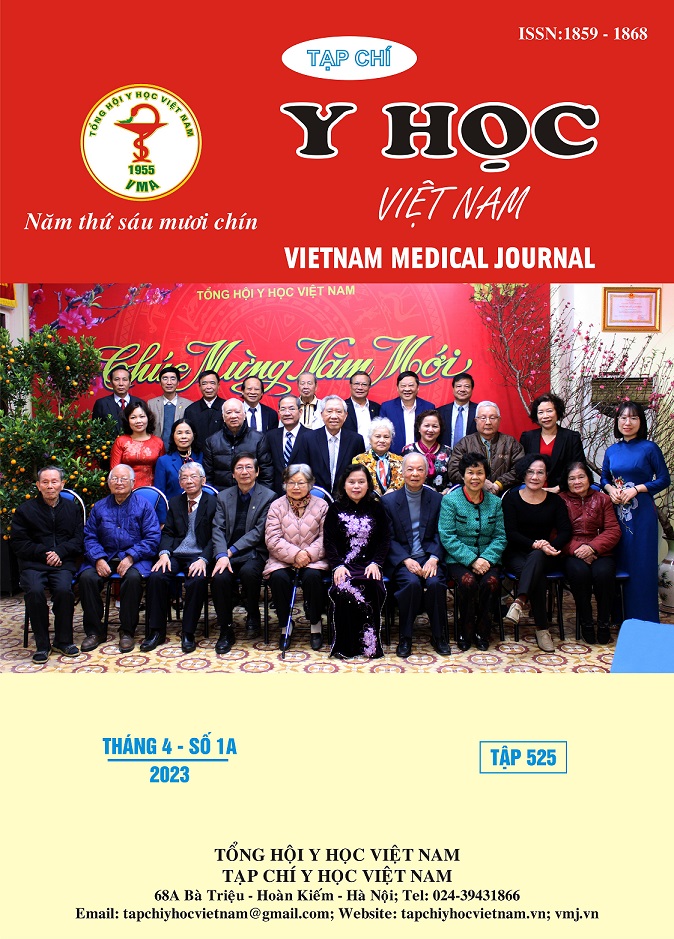RESULTS OF PRIMARY PAROTID CANCER TREATMENT AT K HOSPITAL
Main Article Content
Abstract
Objectives: To evaluate the results of surgery for buccal mucosa cancer at Vietnam National Cancer Hospital. Subjects and methods: A retrospective cohort study followed up on 50 patients with buccal mucosa cancer who were treated at K Hospital from January 2017 to June 2022. Results: The mean of age 55.6 ± 8.3; the male/female ratio: 1/1; 72.4% of the patients had a risk profile (consumption of alcohol, tobacco, and/or betel); 42.0% of the patients had a stage II; Histopathology: squamous cell carcinoma: 94.0%; 59.6% moderate differentiation; DOI >5 mm: 60%; 100% of the patients underwent peroral wide excision of the lesion with reconstruction by free flaps or pedicled flaps; selective neck dissection: 70.0%; Complications: submandibular palsy: 2.0%; flap necrosis: 2.0%; 82.0% had good surgical results. Conclusion: Buccal mucosa cancer occurs most commonly in older adults. risk factors such as alcohol, tobacco, or chewing betel nuts. Surgery was the mainstay of treatment for buccal mucosa cancer. Besides the fact that negative surgical margins can be achieved, the results of pedicled flaps or free flap reconstruction are a top concern that affect the patient’s quality of life.
Article Details
Keywords
Buccal mucosa cancer, surgery, complication, free flap
References
2. Ganpathi Iyer S, Pradhan SA, Pai PS, Patil S. Surgical treatment outcomes of localized squamous carcinoma of buccal mucosa. Head Neck. 2004;26(10):897-902. doi:10.1002/ hed.20096
3. Sagheb K, Blatt S, Kraft IS, et al. Outcome and cervical metastatic spread of squamous cell cancer of the buccal mucosa, a retrospective analysis of the past 25 years. J Oral Pathol Med. 2017;46(6):460-464. doi:10.1111/jop.12537
4. Lee K, Veness M, Pearl-Larson T, Morgan G. Role of combined modality treatment of buccal mucosa squamous cell carcinoma. Aust Dent J. 2005;50(2):108-113. doi:10.1111/j.1834-7819.2005.tb00349.x
5. Patrícia Carlos Caldeira, Andrea María López Soto, Maria Cássia Ferreira de Aguiar et al (2020). Tumor depth of invasion and prognosis of early‐stage oral squamous cell carcinoma: A meta‐analysis. Oral diseases, 26 (7), 1357-1365.
6. Sim Y C, Hwang JH và Ahn KM (2019). Overall and disease-specific survival outcomes following primary surgery for oral squamous cell carcinoma: analysis of consecutive 67 patients. Journal of the Korean Association of Oral and Maxillofacial Surgeons, 45 (2), 83-90.
7. Jing J, Li L, He W, Sun G. Prognostic Predictors of Squamous Cell Carcinoma of the Buccal Mucosa With Negative Surgical Margins. J Oral Maxillofac Surg. 2006;64(6):896-901. doi:10.1016/ j.joms.2006.02.007.
8. D’Alessandro A F, Pinto F R, Lin C S et al (2015). Oral cavity squamous cell carcinoma: factors related to occult lymph node metastasis☆☆☆. Brazilian journal of otorhinolaryngology, 81, 248-254.


